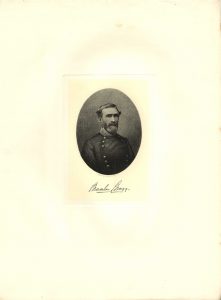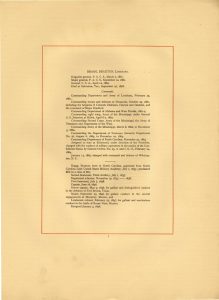Growing up in Mobile, Alabama, I heard the Bragg name often, particularly in relation to a grand home that frequently served as the site of wedding receptions. I left town seven years ago and headed north without having scored an invitation to celebrate at the Bragg-Mitchell Mansion, and I had put the Bragg family out of mind. That is, until settling here in Chapel Hill. Just over sixty miles down the road sits Fayetteville and a certain large Army base bearing the Bragg family name. Confronted again with the Bragg name, I got curious about the family and the ties, if any, between the Braggs of Alabama and those in North Carolina.
The family of fourteen (twelve children – six boys and six girls) hailed from Warrenton, North Carolina, and the male members created an impressive family résumé. The patriarch, Thomas Bragg, a contractor, built the state capitol building in Raleigh after a fire destroyed it in 1830. The eldest son, John, served as a member of the House of Commons after graduating from UNC in 1924 and then moved to Alabama where he became a state representative, a Congressman, and a judge. He also built the aforementioned Bragg-Mitchell Mansion and lived there for over twenty years. The second son, Thomas, also studied law and served in North Carolina’s House of Commons before being elected governor and then a senator. In November 1861, Thomas was appointed Attorney General of the Confederate States of America. The third son, Dunbar, moved to Alabama and then Texas where he became the first postmaster of the town of Fairfield. The fourth son, William, a captain in the Confederate Army, died in 1863 from wounds received at Chattanooga. The fifth son, Alexander, followed in his father’s footsteps and designed the first brick Wake County Courthouse before moving to Alabama where he built numerous buildings. With so many examples to follow, Braxton, the youngest son, seemed destined to succeed.
The last Bragg son was born March 22, 1817. After graduating from Warrenton Academy, Braxton entered the United States Military Academy at West Point at age sixteen. He finished fifth in his class in 1837 and was commissioned with the rank of Second Lieutenant in the 3rd U.S. Artillery. Bragg’s unit was involved in the Second Seminole War and the Mexican-American War, by the end of which he had earned the rank of Lieutenant-Colonel. During his military service, Bragg fought with William Sherman, Jefferson Davis, Winfield Scott, and Joseph Hooker, all of whom would later fight against one another in the Civil War.
Bragg retired with his wife to Louisiana in the 1850s. When Louisiana seceded from the United States on January 26, 1861, the governor named Bragg a Major-General of the Confederate States Army. President Jefferson Davis then promoted his old friend to the rank of Brigadier-General. One year into the war, Bragg was promoted to the full rank of General. As the fifth General of the Confederate States Army, Bragg remains one of only seven to hold that position in the C.S.A.
The North Carolina Collection possesses an 1898 book entitled Military records of general officers of the Confederate States of America published in New York. This book contains portraits of and information about the commander-in-chief, generals, lieutenant-generals, and major generals of the C.S.A. The images below are of the title page and the two pages concerning General Bragg. Bragg served in various posts along the Gulf Coast as well as in Mississippi, Tennessee, North Carolina, and Virginia. In 1864, he was appointed President Jefferson Davis’ military adviser. After the war, Bragg moved from Alabama to Louisiana to Texas, where he died suddenly in Galveston in 1876 at the age of 59. His body was taken to Mobile, Alabama where he was buried in Magnolia Cemetery.
This North Carolina family extended its reach well beyond the town of Warrenton and the state’s borders, and the Bragg name certainly has a new meaning for me. Stay tuned for more about General Bragg when the next Artifact of the Month entry is posted!




Bragg wasn’t a very popular or good officer, apparently, whenever he commanded a unit or place during the Civil War.
My favorite historic headline of all time (in the Wilmington, NC paper), was after he took command of the defense of the city and peninsula: it was “GOODBYE WILMINGTON”